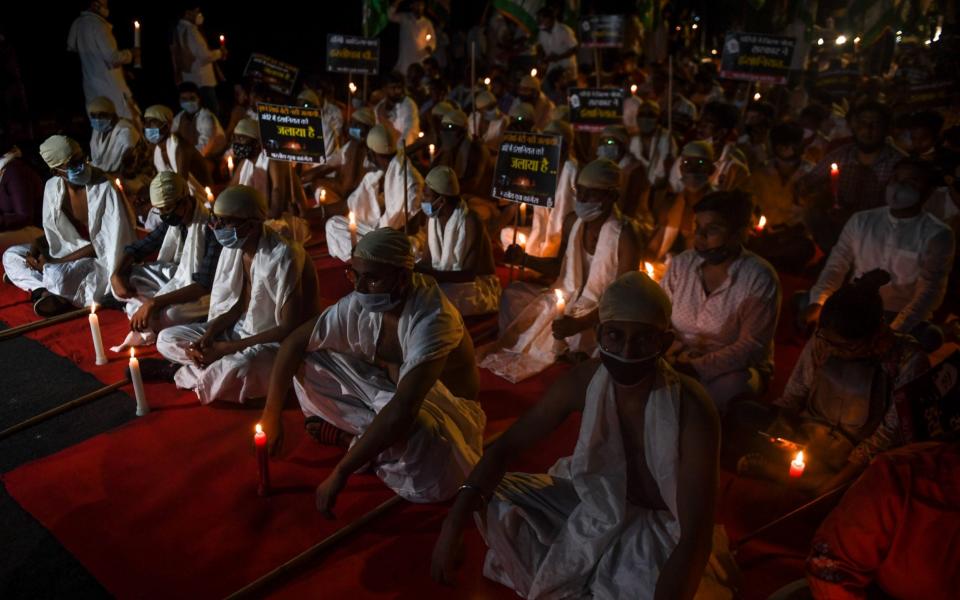Manisha Valmiki’s horrific death shows how little has changed in India for women

With the wood still hot from flames, the heartbroken mother cried tears of devastation as she watched the smoke from her daughter’s body billow into the air.
She was mourning 19-year-old Manisha Valmiki, who died this week in a Delhi hospital – a fortnight after she was allegedly gang-raped in her village in northern India.
Open cremations are normal in the Hindu faith. But what is not normal is for family members not to be allowed to cremate their own loved ones – yet the teenager was cremated in the early hours of Wednesday morning by police officials.
Her devastated relatives allege that the local police tried to force them to conduct the last rites in the middle of the night. When they refused, they went ahead regardless, leaving the family to find out about the cremation from media sources. By the time her mother reached the site, her daughter’s body had turned to ash.
It is yet another harrowing example of the way in which women in India are still seen as objects, and the gangs of men still think they can get away with barbaric acts. Even more devastating is that these crimes happen so often within the Dalit community, formerly known as the “untouchables”, part of India’s rigid system of hierarchy. Despite laws that now protect them, discrimination remains a daily reality for the Dalit population, thought to number around 200 million.
On September 14, in the village of Boolgarhi (population 750) in Hathras district, in India’s northern state of Uttar Pradesh – just a 90-minute drive from the Taj Mahal – the young woman had gone to the fields with her mother to collect animal fodder, as she might any other day. At some point, she went missing, apparently dragged from the field by her neck. She was found beaten and tortured – her tongue lacerated and her spine permanently damaged.
Two weeks later, on Tuesday, she tragically died of her injuries in hospital. Before her body gave up, she told police that she had been gang-raped and named four Thakur upper caste men, who lived opposite her, as the culprits.

It is a chilling echo of the brutal gang rape of 23-year-old student Jyoti Singh (nicknamed ‘Nirbhaya’, meaning ‘fearless’) on a bus in Delhi, in 2012. She too died of her horrific injuries in hospital, bravely naming her attackers before she did. Four of them were executed in March this year.
Then, millions poured out on to the streets all over India to protest for justice and an end to violence against women. The hashtag #JusticeForNirbhaya circulated on social media.
This week, too, there have been widespread protests in the national capital Delhi – despite high coronavirus rates in the city – and #JusticeforManishaValmiki #RIPManisha have trended online.
On Wednesday, the police detained and charged around 182 protestors, including political leaders and students.
Activists say police must now explain why they took the “inhumane decision”. “They illegally cremated her despite her family wanting to do the last rites. This shows how Dalits are treated and the institutional discrimination against them in Uttar Pradesh,” said one.
The victim’s brother had said that the police put pressure on the family to carry out the funeral immediately. “When we refused, they took her body in an ambulance and cremated her,” he explained.
Officials have not made a statement addressing the allegations. But the Hathras police have denied reports that they cremated Manisha without the family's consent – a claim that many local journalists have contested. Videos shared widely on TV channels and social media show her distraught family and villagers making several attempts to claim her body, as the police ambulance arrived in the village.
The four men – Sandip, Ramu, Lavkush and Ravi – have been arrested and, according to Hathras police superintendent Vikrant Vir, will face murder charges. One of the accused is a married father of two, two are single and the fourth recently moved back to the village from the city of Agra.

Yet the Uttar Pradesh police have stated there is no evidence that Manisha was raped. Vir has said a report by the Aligarh hospital, where she was first admitted, does not confirm sexual assault. “The medical report mentions that there were injuries but it does not confirm forced sexual intercourse. They are waiting for a report of the forensics. As of now, doctors say that they’re not confirming rape,” he said.
The post-mortem has revealed that the teenager was strangled – a ligature mark was present in front of her neck – and says that she died of a spinal cord injury. The report does not specify if rape had taken place.
India’s Women and Child Development minister, Smriti Irani, has not made any formal comment regarding the case, despite being a prominent face during the protests in the 2012 case. But Prime Minister Narendra Modi has reportedly asked Uttar Pradesh’s chief minister, Yogi Adityanath, to take strict action against the accused. He has already promised the family £26,000 in compensation, a government job for a family member, a house, and a promise that the trial will be taken up in a fast-track court.
It has also been claimed that the Nirbhaya Jyoti Trust legal advisor, Seema Samridhi, has been approached by the family to represent them – but authorities have not allowed her to meet with them.
India’s annual crime report, published earlier this year, found a rape is reported every 15 minutes in the country. There were a reported 34,000 rapes in 2018, fueling India’s dismal reputation as one of the worst places in the world to be female.
Even though rape and sexual violence in India has been under the spotlight since 2012, it seems there is little sign of improvement for the women who live there.

